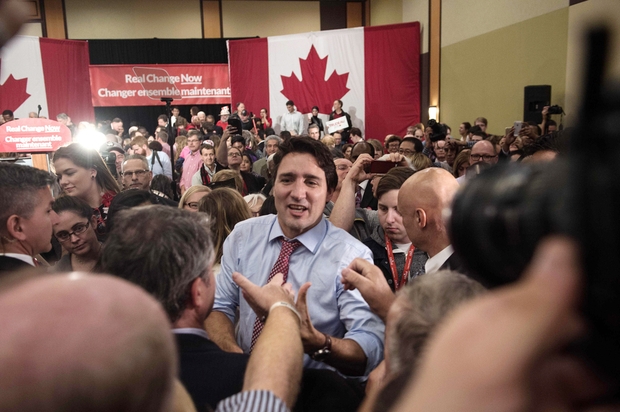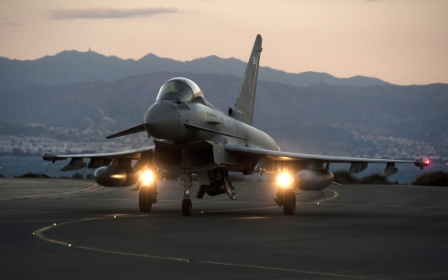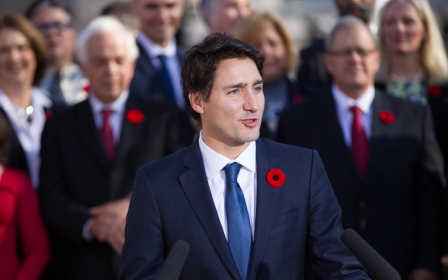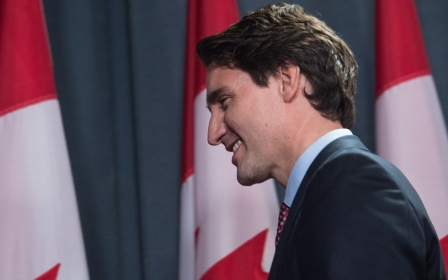‘Rocky road’ ahead as Canada amends sanctions on Iran

TORONTO, Canada - Canada’s decision to amend sanctions on Iran reflects a desire to make a clean break from the “belligerent position” employed by Stephen Harper’s former Conservative government in the Middle East, experts say.
But new Prime Minister Justin Trudeau still faces an uphill battle in getting people across the region to view Ottawa as an honest broker, said Ariel Salzmann, an Islamic and world history professor at Queen’s University in Kingston, Ontario.
“People were very disappointed over the last decade in Canada’s positions. I think it’s going to be a challenge for the new administration to really rework these relationships,” Salzmann told Middle East Eye.
By easing restrictions on Iran, the Liberal government, Salzmann said, is “trying to sort of claw back this belligerent position … and get back to some sort of pre-Harper status quo vis-a-vis the region”.
Canada formally modified its sanctions on Iran on 5 February.
Among the changes now in place, Ottawa has removed a blanket prohibition on imports from, and exports to, Iran, and lifted wide prohibitions on providing or receiving financial services to or from Iran and making investments inside Iran.
The amended sanctions also reflect United Nations recommendations stemming from the Iranian nuclear deal between Tehran and the P5+1 countries: US, France, UK, China and Russia plus Germany.
Ottawa has also signalled a desire to re-establish diplomatic relations with Iran, which were severed completely in 2012 when the Conservatives closed the Canadian embassy in Tehran and expelled Iranian diplomats from the country.
At the time, Canada labelled Iran a state-sponsor of terrorism and imposed strict economic sanctions on the country. It also closed the Canadian bank accounts of many Iranian-Canadians and Iranians in Canada, who suddenly found themselves without consular services and the ability to transfer money home.
Canada is maintaining restrictions, it said, on “Iran’s access to sensitive goods from Canada, especially with respect to nuclear proliferation and the development of ballistic missiles”.
Economic benefits
Canada’s Foreign Affairs Minister Stephane Dion said in late January that the former government pursued a “misleading approach” to Iran.
“It’s not good for the people in Iran. It’s not good for the promotion of human rights. It’s not good for our strategic interests in the region. It’s not good for Israel. It’s good for no one, we’ll change this policy,” Dion told the House of Commons.
Canada is betting it will have a lot to gain economically by renewing ties to Tehran. Dion has argued that Canadian companies, such as airplane manufacturer Bombardier, will see a boost.
The Montreal-based company had hoped to step in to fill Iran’s need to update its fleet of airliners. But on 28 January, Iran announced a deal with French company Airbus to buy dozens of airliners and build co-operation between the Iranian and French civil aviation sectors.
“If Airbus is able to do it, why Bombardier would not be able to do it?” Dion said at the time, The Canadian Press reported. “In which way it’s helping Canada or the Iranian people or Israel or anyone that Canada is hurting its own industry?”
But just how much Canada will benefit financially by opening the door to Iran remains uncertain.
Houchang Hassan-Yari, a professor at the Royal Military College of Canada, told MEE in an email that Canadian companies could potentially make billions of dollars by investing in Iran. Companies in the fields of civil aviation, car manufacturing, pulp and paper, oil and gas, and industrial machinery stand to benefit most, he said.
“The Iranian economy is in need of new technologies and consumers [are dying] for good Western products,” Hassan-Yari said.
While economics and diplomacy go hand-in-hand, “Canada is gradually missing the boat,” Hassan-Yari said.
President Hassan Rouhani has already reached out to France and Italy, while Ayatollah Khamenei and his allies prefer to strike deals with China and Russia, he added.
James Devine, a professor at Mount Allison University specialised in Iranian politics, said Canadian goods won’t likely flood the Iranian market, but Canadian oil and minerals companies could help Iran rebuild its oil infrastructure.
He said Ottawa could also use the example of Bombardier missing out on the airliner deal to get Canadians on board with its new diplomatic policy.
“Now they can turn around and say, ‘Look, here’s a concrete case where Canada missed out.’ We’re talking about a situation where a Canadian company missed an opportunity because of Harper’s policies. That makes it easier to sell talking to Iran,” Devine told MEE.
The speed at which Canadian companies can invest in Iran may also impact how quickly diplomatic ties between the two countries are re-established.
“If it looks like (there are) benefits for Canadian businesses, they’ll move fairly fast,” Devine said.
‘Rocky road’ ahead
While the Canada-Iran relationship hit its lowest point in 2012, ties between the two countries had been strained for a decade earlier.
In 2003, Iranian-Canadian photojournalist Zahra (Ziba) Kazemi was killed after she was detained for taking photos outside the notorious Evin prison. Kazemi was allegedly being beaten, sexually assaulted and tortured while in detention.
In late 2014, Stephan Hashemi lost an appeal to the Canadian Supreme Court for the chance to sue Iran in Canadian court for his mother’s death.
It also remains to be seen how renewing diplomatic ties to Iran will affect the cases of Iranian-born Canadian residents Saeed Malekpour and Mostafa Azizi, both held at Evin prison. Their relatives in Canada have called on Trudeau to pressure Iran to release them and bring them home.
Devine said the Kazemi case, coupled with internal Iranian politics and Iran’s ongoing diplomatic efforts to strengthen relations with the US and other Western powers, means Canada has a long way to go before bridges with Iran are fully mended.
Rouhani, for instance, will have to tread carefully ahead of elections for parliament and the Assembly of Experts at the end of February. “Canada has sort of become a target for hard-line criticism inside Iran after we broke off relations. If Rouhani is too welcoming to Canada, that will create more political problems for him at home,” Devine said.
“There are a lot of hurdles between where we are now with sanctions being eased and getting back to full diplomatic relations. It could be a rocky road.”
But Salzmann said getting into Iran first is “a very astute political move” and puts Canada in a good position to act as a mediator between Iran and the US.
“Canada can play a role in sort of being a midwife in advancing these relationships between North America and Iran, in anticipation of further developments south of the border,” she said.
“In that respect, I think the benefits are many-fold.”
New MEE newsletter: Jerusalem Dispatch
Sign up to get the latest insights and analysis on Israel-Palestine, alongside Turkey Unpacked and other MEE newsletters
Middle East Eye delivers independent and unrivalled coverage and analysis of the Middle East, North Africa and beyond. To learn more about republishing this content and the associated fees, please fill out this form. More about MEE can be found here.




